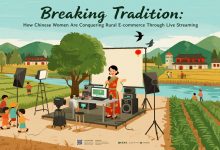The Reality Check
2025 hit different for Chinese graduates.
With 12.22 million university graduates flooding the job market, competition reached brutal levels. Landing an offer from a major AI company? That’s like winning the lottery.
But some made it happen.
These are their real stories. Raw, unfiltered accounts of what it actually takes to break into AI when everyone else is fighting for the same spot.
Story 1: From Teacher Training to Tech Freedom
Obi, Master’s Graduate → AI Product Manager at Baidu
June 30th changed everything for me.
That morning, I packed my dorm room at 7 AM. By 10 AM, I was walking into Baidu’s tech park with my luggage, officially starting my career as an AI product manager.
The relief was overwhelming.
While my classmates stressed about civil service exams and teaching positions, I had already secured my future. Six months earlier, I’d converted my internship into a full-time role.
The Pivot That Saved My Career
I studied Geographic Information Science at one of China’s top teacher training universities. Everyone expected me to become a teacher. Hell, I expected it too.
But the teaching job applications went nowhere. No callbacks. No interviews. Just silence.
That’s when I discovered AI product management.
My interdisciplinary background suddenly became an asset. Geography, mapping, remote sensing, computer science – it all clicked together in ways I never imagined.
The job hunt for AI roles? Completely different story.
First week of applications, I landed an interview with iFlytek. Then iQiyi called. Then Didi. Then Meituan, Baidu, and Xiaomi.
All wanted to talk.
The Project That Changed Everything
During my master’s program, I tackled something nobody else wanted to touch. My advisor needed drones to fly through forests autonomously. No roadmap. No prior experience in the lab.
I dove deep into research papers. Taught myself development from scratch. Analyzed every major drone manufacturer’s APIs. Chose DJI’s platform for custom development.
Months of testing. Multiple field experiments. Countless failures.
But I made it work.
That project became my golden ticket. Every interviewer lit up when I described building something from zero knowledge to working prototype.
Life After the Offer
Two months into my internship, I faced the conversion interview. Four executives around a conference table. Twenty minutes to prove I belonged.
I wasn’t nervous. My work spoke for itself.
The role keeps me energized. I bridge business needs with technical reality. When stakeholders want the impossible, I find ways to make it possible – or explain why it’s not worth doing.
My mentor trusts me with critical projects. The team collaborates smoothly. I’m actually contributing value instead of just grinding through academic assignments.
Best part? I have weekends again.
During grad school, I lost myself. Constantly anxious, unfocused, going through the motions. Now I’m back to being human. Gardening, mixology, cycling, seeing friends.
Every day I wake up excited about what’s ahead.
Story 2: The 40-Interview Gauntlet
Chen Wei, Master’s Graduate → AI Algorithm Engineer
Getting an AI algorithm engineering offer nearly broke me.
My background wasn’t impressive on paper. Undergraduate from a non-prestigious university. Master’s from a decent but not elite school.
Everyone said I didn’t have what it takes.
The Education Barrier
AI algorithm roles demand pedigree. Top-tier university degrees. Competition wins. Publications in prestigious conferences like NeurIPS or CVPR.
I had practical experience instead. Real projects with real business impact. But that doesn’t show up in resume filters.
The Numbers Game
From March 2024 to April 2025: 130+ applications submitted. 40+ interviews completed.
Each interview consumed 1-2 hours. Some interviewers were respectful. Others treated my resume like garbage, questioning every decision I’d made.
Those sessions hurt. But I learned to bounce back faster.
The False Start
I landed a Big Tech internship in May 2024. Took a 16-hour train from Fujian to Beijing. Stayed in 50-yuan hostels after work.
Two months later, they cut all conversion spots due to “business restructuring.”
Zero interns got hired. Not one.
Devastating? Absolutely. But I kept documenting everything on social media, helping other job seekers learn from my experience.
The Reality of Success
Ten offers eventually came through. But success meant making hard choices about what mattered most.
Work-life balance became my non-negotiable. That Big Tech internship showed me what 80-hour weeks do to your body and mind. My roommate developed multiple chronic conditions from continuous overtime.
Between two final offers – higher pay with brutal hours in Hangzhou, or reasonable compensation with sustainable pace in Wuhan – I chose Wuhan.
The Hangzhou HR was brutally honest: “Your education background is weak compared to other interns. Leadership will notice. You’ll need to outwork everyone just to survive probation.”
That conversation clarified everything.
I stopped chasing maximum short-term compensation. Long-term career growth and quality of life matter more than starting salary.
Story 3: Ditching Graduate School for Real World Impact
Juya, Undergraduate → AI Product Manager
I had an offer from Imperial College London for graduate school.
I turned it down.
Four major tech offers versus two more years of academic theory? No contest.
Fighting Family Expectations
My father works in finance. Expected me to follow the traditional path. Graduate school, then prestigious finance job.
We clashed repeatedly about my career choice.
But I knew myself better than he knew me. Product management required skills I actually possessed – communication, logical thinking, curiosity, problem-solving.
Finance felt like playing with abstract numbers that didn’t connect to real human needs.
The Internship Tour
Starting sophomore summer, I interned at Alibaba, an AI startup, and OPPO. Each role taught me something different about the industry.
Tech company culture felt right immediately. Casual dress codes, practical problem-solving, merit-based discussions.
I sat in product requirement meetings where teams debated button placement, color choices, interface width down to the pixel. Concrete decisions affecting real users.
That beats analyzing macro-economic trends any day.
The Technical Breakthrough
Everyone assumes AI product managers need deep technical knowledge. That’s partially true but missing the bigger picture.
Understanding technology matters. But understanding human behavior matters more.
During one internship, I got assigned to design an AI upgrade for a smartphone app. Had multiple concepts but no concrete demonstrations.
Abstract ideas don’t convince engineering teams. I needed proof of concept.
Using Dify (an open-source platform), I built working prototypes overnight. Full user workflows, model selection interfaces, input-to-output demonstrations.
Leadership approved immediately. Team collaboration accelerated.
My presentation to the broader team became a training session. Colleagues asked detailed questions about implementation.
That moment proved something important: product management isn’t about knowing every algorithm. It’s about translating technical capabilities into user value.
Breaking the Elitism
Many people assume technical roles are inherently superior to business roles. That education level equals capability.
I prove them wrong daily.
85% of my classmates chose graduate school. Many questioned my “premature” career start.
But AI product management rewards accumulated experience more than academic credentials. Every semester I gain hands-on knowledge, my graduate school peers study theoretical frameworks.
Real-world problem-solving beats classroom exercises.
The Bigger Picture
These real stories reveal uncomfortable truths about breaking into AI careers:
Merit matters, but timing matters more. Economic cycles create or destroy opportunities regardless of individual qualifications.
Practical skills trump theoretical knowledge. Employers want people who can deliver results, not recite textbook concepts.
Personal fit determines long-term success. Chasing maximum salary without considering work-life balance leads to burnout.
Alternative paths exist for determined candidates. Traditional education credentials help, but aren’t the only route to career success.
The AI job market remains brutally competitive. But these real stories prove that strategic thinking, persistent effort, and authentic self-knowledge can overcome systemic barriers.
Your background might not be perfect. Your grades might not be stellar. Your network might not be extensive.
But if you solve real problems and create genuine value, opportunities will find you.
That’s the truth these success stories teach us.








